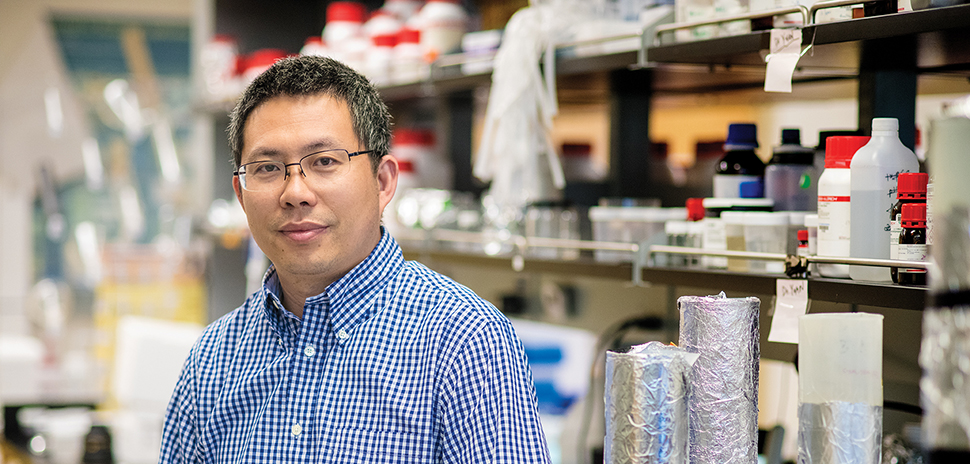SCIENTISTS EXAMINE POTENTIAL OF SEED-BASED OIL
![]() The oil found in the seeds of a plant common in Asia could have potentital as a lubricating oil, and two researchers at the University of North Texas are investigating its potential.
The oil found in the seeds of a plant common in Asia could have potentital as a lubricating oil, and two researchers at the University of North Texas are investigating its potential.

Diana Berman, [Adriana Salazar/UNT Photo]
The scientist, Diana Berman, professor in the university’s college of Engineering Materials Science and Engineering, and Kent Chapman, director of the BioDiscovery Insitute, are looking into the oil contained in the seeds of the Chinese violet cress.
“The oil contained in the seeds of the Chinese violet cress has the potential to be a strong competitor in the lubrication industry,” Berman said in a release. “It has a high viscosity beneficial for friction and wear reduction. It can stand up to the heat needed to be an industrial lubricant. But, unlike petroleum oil and synthetics, it is 100 percent renewable.”
Chapman said that for years, the Chinese violet cress has been cultivated as an ornamental plant in Asia.
“It is very exciting to see that seeds from such a decorative flower can demonstrate unexpected superior performance,” Chapman said.

Dr. Yi Hong in his laboratory. [Photo Courtesy UT Arlington]
UTA RESEARCHERS DEVELOPING HYDROGEL TO REPAIR HEART MUSCLES
Using a $460,000 grant from the National Institutes of Health, a University of Texas at Arlington researcher is working to develop a new biodegrabble, bioactive hydrogel that could repair heart tissue following a heart attack.
Bioengineering professor Yi Hong is leading a team to develop the material.
“We are working on a new biodegradable and bioactive hydrogel material that could be injected into the heart to promote cardiac repair after a heart attack.”
Yi Hong
“Heart attacks, or myocardial infarction, is a leading cause of morbidity and mortality worldwide,” Hong said in a release. “We are working on a new biodegradable and bioactive hydrogel material that could be injected into the heart to promote cardiac repair after a heart attack.”
UTA said that recent research indicates that an injection of a hydrogel derived from heart tissue with the cells removed can promote the development of new heart muscle cells and aid in restoring heart function. The material is known as the extracellular matrix.
“My collaborators and I aim to take this one step further and develop a blended injectable biogel that combines the scaffolding and repair properties of the extracellular matrix with nanoparticle-based drug delivery technologies,” Hong said in the release.
BRIT RESEARCHERS BEGIN 4-YEAR STUDY OF ENDANGERED PHILIPPINES PLANTS
Researchers at the Fort Worth-based Botanical Research Institute of Texas (BRIT) will begin a four-year research project in the Philippines this month thanks to a $1.3 million grant from the National Science Foundation.
“We are so excited about this grant and the important work it will accomplish,” BRIT Executive Director Ed Schneider said in the release. “For the last three years, we have worked diligently to put together the right combination of scientific personnel, tools, and support programs to make a run at this caliber of grant; winning it validates our efforts and scientific direction and sets the stage for larger grant wins.”
“We are so excited about this grant and the important work it will accomplish.”
Ed Schneider
The project, called titled “Plant Discovery in the Southern Philippines,” will be led by Peter Fritsch, BRIT’s vice president of research. Fritsch will be principal investigator with co-principal investigators Taylor Quedensley of BRIT, Darin Penneys of the University of North Carolina at Wilmington, and Daniel Nickrent of Southern Illinois University Carbondale. Field expeditions will begin in the spring of 2019, BRIT said in a release.
According to BRIT, a nonprofit, international research and education organization, the Philippines contain unique floral and faunal diversity that includes ferns, orchids, pitcher plants, and begonias that are critically threatened by habitat loss because only roughly 3 to 7 percent of the island nation’s original habitat remains.
#DallasDiscovers
READ NEXT
https://dallasinnovates.com/discovery-new-center-fills-gaps-dfw-severe-weather-forecasts-helping-body-battle-superbugs/
![]()






































































